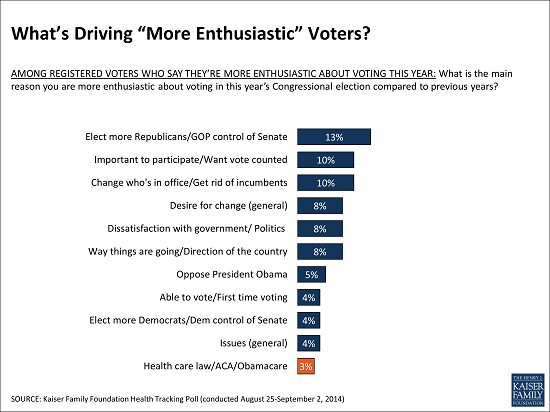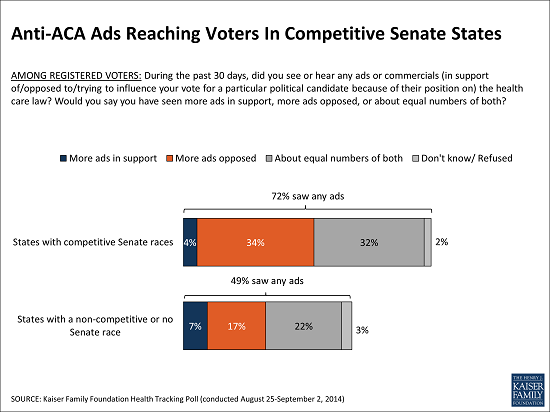
The independent source for health policy research, polling, and news.
Republicans Have an Edge in Voter Enthusiasm Heading Into Fall, But Few Cite ACA as Motivating Factor
Anti-Obamacare Ads Reaching Most Voters in Competitive Senate Races
Health Care Ranks Among Several Second-Tier Issues for Voters in Midterm Elections Behind the Economy
The latest Kaiser Family Foundation Health Tracking Poll finds Republicans with a modest edge in terms of voter enthusiasm, but the Affordable Care Act, also called Obamacare, is not the main motivator.
The poll finds that 27 percent of Republicans say they are “more enthusiastic” about voting this year than in past Congressional elections, compared with 20 percent of Democrats and 18 percent of independents.
Asked to say in their own words why they’re more excited about voting this year, the most common response among enthusiastic voters relates to a desire to elect more Republicans or help Republicans gain control of the Senate (13%). Just 3 percent mention the health care law specifically.

The findings come from the Foundation’s August-September poll, which includes a special look at registered voters’ views and what role, if any, the ACA might be playing in the upcoming midterm election. The survey was released at a joint Kaiser Family Foundation/Cook Political Report briefing in Washington.
Nationally about half of voters (53%) report seeing some type of political or issue advertising related to the health care law in the previous 30 days, and nearly three times as many say that most ads were opposed to the law (20%) as say most were in support of it (7%).
Among voters in the 11 states with the most competitive Senate races as rated by The Cook Political Report, more than seven in ten (72%) report seeing ads related to the health care law, and the balance is even more heavily tilted against the law (34% saw more ads in opposition; 4% saw more ads in support).

The poll finds voters divided in terms of whether they want the candidates to talk about the health care law, with similar shares saying they are tired of hearing candidates talk about the law and would rather they focus on other issues (48%) and they feel it’s important for candidates to continue the debate (47%).
The law’s opponents are clearly more interested in continuing the debate: Among Republican voters and those with an unfavorable view of the law, about six in ten want candidates to keep up the debate, while similarly large shares of Democrats and those who view the law favorably say they should move on to other issues.
When asked to name in their own words the two most important issues in deciding their vote for Congress, the most frequently-mentioned issue is the economy and jobs (21%). Fewer voters cite health care (13%, including just 3% who specifically mention the Affordable Care Act or Obamacare). Mentions of health care are similar among Democrats (15%) and Republicans (16%), but lower among independent voters (9%).
As a voting issue, health care is clustered with a number of other issues, including foreign policy/national defense/terrorism (13%), dissatisfaction with the way government is working (12%), immigration and border security (9%), and education (9%).
While not a top-tier issue for most voters, almost four in ten (38%) say that if a candidate voted for the health care law, they would be less likely to vote for that candidate, while three in 10 (29%) say they would be more likely to do so. When asked about a candidate who voted to repeal the law, the results flip, with four in 10 (41%) saying they would be more likely to vote for that candidate and three in 10 (30%) saying they would be less likely to do so.
To put the ACA in context with other issues, nearly half (48%) of voters say they’d be more likely to vote for a candidate who supports increasing the minimum wage, and more than four in ten (44%) say they’d be less likely to vote for a candidate who supports a path to citizenship for undocumented immigrants.
The poll also shows that national issues like the ACA are only one factor influencing voters. About a third (34%) of registered voters say specific national issues will make the biggest difference in how they vote for Congress, while about a quarter each say their vote will be mostly based on the candidate’s character and experience (24%) or local or state issues (23%), and one in 9 (11%) say the candidate’s party affiliation will be the most important factor.
Overall, registered voters are fairly evenly divided between those who prefer to see the Democrats hold on to their majority in the Senate (43%) and those who would prefer to see the Republicans gain the majority (40%). This narrows to a dead heat among likely voters (43% favor each party’s control), but Republicans hold an edge among those who say they’re more enthusiastic about voting: 50 percent of these voters say they’d prefer to see the Republicans gain the majority and 38 percent say they’d like the Democrats to retain control.
The latest poll also tracks the public’s overall views of the health reform law. Key findings include:
- Public opinion on the ACA overall remains more negative than positive, with 47 percent viewing the law unfavorably (closer to levels measured earlier this year after rising to 53 percent in July) and 35 percent having a favorable view. Views are similar among registered voters (49% unfavorable, 35% favorable); opinion tilts even more negative among likely voters (51% vs. 35%).
- At the same time, nearly twice as many Americans want their Congressional representative to work to improve the law (63%) rather than to repeal it and replace it with something else (33%).
- Partisan divisions on the law are as deep as ever on overall opinion, on the next steps for Congress and even in perceptions of how the law has impacted their own families. Democrats (27%) are more likely than independents (11%) and Republicans (2%) to say that the law has directly helped them, while Republicans (46%) are more likely than are independents (31%) and Democrats (10%) to say that the law has directly hurt them.
- Also available is the August-September installment of the Kaiser Health Policy News Index, which finds public attention this month was more focused on news of conflicts both here in the U.S. and overseas than on health policy issues.
Methodology
The latest tracking poll was designed and analyzed by public opinion researchers at the Kaiser Family Foundation and was conducted from August 25-September 2 among a nationally representative random digit dial telephone sample of 1,505 adults ages 18 and older, including 1,239 who said they were registered to vote. Interviews were conducted in English and Spanish by landline (753) and cell phone (752). The margin of sampling error is plus or minus 3 percentage points for the full sample and for registered voters. For results based on other subgroups, the margin of sampling error may be higher.